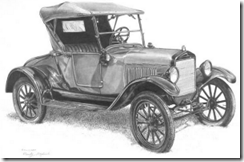Predicting The Future in Technology
Posted by Keith Elder | Posted in Technology | Posted on 21-02-2011
Tags: technology
Information Week recently ran an article on the “12 Worst Tech Predictions Of All Time”. It was an OK read, nothing earth shattering but it did get me to thinking about where we are today and where we might be in the future.
It is so hard to predict the future when it comes to technology and I for one can see how some of those on that list said what they said. From their perspective at that time I’m sure it seemed pretty obvious to them.
The thing is we cannot predict things in technology because there are too many out of band inventions that help propel another invention forward. Let’s take the car for example. It has been around for awhile and is the second largest transaction a family purchases (unless they buy a boat).
 Do you think someone 100 years ago would have been able to predict that a car would pull up to a restaurant and automatically check in on Four Square? No. Why? Obviously a lot of things hadn’t been invented including the Internet, satellites in space, cell phones, 3G networks, etc. Even today not all cars do this, it is very cutting edge for a car to do this even today but it is coming. Now why this is coming I don’t know. I think it is asking for trouble because if your car checks in on Four Square you are essentially telling organized crime you aren’t home so you can get robbed but I digress.
Do you think someone 100 years ago would have been able to predict that a car would pull up to a restaurant and automatically check in on Four Square? No. Why? Obviously a lot of things hadn’t been invented including the Internet, satellites in space, cell phones, 3G networks, etc. Even today not all cars do this, it is very cutting edge for a car to do this even today but it is coming. Now why this is coming I don’t know. I think it is asking for trouble because if your car checks in on Four Square you are essentially telling organized crime you aren’t home so you can get robbed but I digress.
Here’s another car example. I’m sure someone thought about putting a telephone in a car for a very long time. I can remember when I stepped foot in my wife’s 1993 Grand Prix for the first time it had a built-in cell phone. It was huge and mounted in the floor. I can remember us driving around town and when she’d pull up to a red light I’d pretend like I answered the phone and was conducting business. People would always stare. Today it is common place. Back then though it wasn’t the norm to say the least. The truth is she never talked on it though because it was so expensive.
 Fast forward to today (18 years later) and she doesn’t even need a phone in her car because she always has one with her. The new car I purchased in December for Christmas for her has Bluetooth. When someone calls her cell phone she answers in the car by merely pressing a button and she is able to talk hands free in the car.
Fast forward to today (18 years later) and she doesn’t even need a phone in her car because she always has one with her. The new car I purchased in December for Christmas for her has Bluetooth. When someone calls her cell phone she answers in the car by merely pressing a button and she is able to talk hands free in the car.
Think for a second of all the things that had to be invented in order for her to simply press a button in her car and receive a phone call. How is someone supposed to predict this? First off the computer chip, memory, LEDs, lithium batteries, LCD displays, Bluetooth, cell phone towers, cell phones, and the list goes on. You get the idea. That one simple press of a button to answer a phone call requires an immense amount of technology when it is broken down. It would be an interesting study to see how many patents there are when answering a phone call in a car today hands free.
 My point? Predicting the future, especially when it comes to technology, is tough because there are so many things that have to be invented before we get to the next step. For example where is my flying car? We’ve been waiting on this for a long time but we just aren’t there yet because we are missing some major inventions in order to convert it from science fiction to reality. And just in case you were curious you can buy a flying car today, but it isn’t near as cool as the one in the Jetsons.
My point? Predicting the future, especially when it comes to technology, is tough because there are so many things that have to be invented before we get to the next step. For example where is my flying car? We’ve been waiting on this for a long time but we just aren’t there yet because we are missing some major inventions in order to convert it from science fiction to reality. And just in case you were curious you can buy a flying car today, but it isn’t near as cool as the one in the Jetsons.
I believe when trying to come up with the next big idea or predict what is going to happen a few years out we have to take a serious look at what is already around us and use that to create, think out of the box and invent.
Robert Kearns did this in 1964 when he created the intermittent windshield wiper. Surely you’ve seen one before, they are on most automobiles since 1969. What Robert did wasn’t amazing, or ground breaking or earth shattering to create a windshield wiper. He got the idea from how an eye lid worked. Robert had to defend his patent and wound up suing the car companies (and won).
The great story about Robert is during his trial he asked his son to go find the book “The Tale of Two Cities”. It starts out like this:
IT WAS the best of times, it was the worst of times, it was the age of wisdom, it was the age of foolishness, it was the epoch of belief, it was the epoch of incredulity, it was the season of Light, it was the season of Darkness…
The lawyers for the motor companies were arguing that Robert didn’t have any grounds for his invention because he used existing parts. Robert argued this was a classic book and Charles Dickens didn’t invent any of the words in the book. The words were already existing words yet all the author did was rearrange them to make them work. That is essentially what he did to create the intermittent windshield wiper. Robert merely rearranged existing components to create his invention thus changing the lives of anyone to step into a car during a rain storm since.
What a great lesson Robert teaches us as this is a way of possibly predicting the future or even better yet, coming up with that next great idea. It is simply a matter of rearranging the existing parts.
While I don’t have the answer for predicting the future I think this is one important aspect of being able to see where things *might* progress. Just by looking around us we can see things being created or invented all the time. A lot of these inventions were created for a particular purpose but when applied or rearranged in a different manner we could have something great.
So if you want to predict the future in technology or create the next big thing look around at all the things we already have and then think about how to rearrange them to make them work in extraordinary ways. That my friends will be the future.



A couple months ago I was reading a Paul Graham essay, http://www.paulgraham.com/road.html, from 2001 and I was amazed by how he saw the world we live in today back in the mid 90s, how I didn’t then, and how some people today don’t.